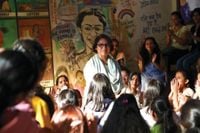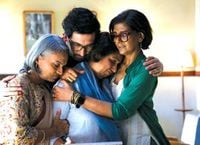In a landscape increasingly filled with young adult campus dramas, Ziddi Girls on Amazon Prime Video has emerged as a refreshingly unique concept that resonates far beyond its intended demographic. What initially seemed like just another college-based web series has managed to touch the hearts of viewers from their twenties to their sixties, creating an unexpected intergenerational connection.
Ziddi Girls encapsulates the quintessential elements of a campus drama, with its narratives revolving around friendships, romance, and academic challenges. However, its appeal extends drastically beyond the traditional boundaries of age and gender, capturing the attentions and affections of audiences that few shows can boast of today.
One of the most significant reasons for the show's success lies in its ability to evoke nostalgia. College life is often a transformative phase that shapes personalities and fosters lifelong friendships. It is during these years that many individuals discover who they are, which is precisely why this show resonates so well across different generations.
Rangita Pritish Nandy, the creator of Ziddi Girls, explains, “That universal nostalgia about growing up, finding yourself, and finding your voice—everything that college, hostel life, and youth bring along—that’s what makes Ziddi Girls so compelling across generations. College is possibly the most personal, most vulnerable time of our lives—caught between wanting to be treated as adults and actually having to do the work of being one.”
Director Shonali Bose adds another layer to the show's charm, emphasizing how unforgettable the formative years of becoming an adult can be. She asserts, “The formative years of becoming an adult—especially in a hostel—are unforgettable. It’s where you truly become YOU. Ziddi Girls captures that phase so authentically that people from all generations feel like it’s THEIR story—regardless of gender or age.”
Co-director and writer Neha Veena Verma notes that dialogue was at the heart of writing Ziddi Girls. She states, “The spirit of dialogue was the start of all our conversations when writing Ziddi Girls—a dialogue between generations, ideologies, peers, teachers, and parents. In these politically divisive times, the show is an attempt to connect with people we might disagree with, rather than shutting them down.”
This generational dialogue is rooted in personal experiences and the diverse backgrounds of the writers and directors involved. Co-director Vasant Nath admits that the overwhelming response was unexpected: “While Gen Z was the focus of Ziddi Girls, the show drew from writers, creators, and directors who spanned multiple generations. The alchemy of the research and our personal experience lends the show the resonance audiences are experiencing across age and gender.”
In addition to its nostalgic elements, Ziddi Girls also explores themes of rebellion and resistance. The series profoundly portrays young women standing up against their 7 PM hostel curfew, challenging the system and demanding their rights. This theme is something older generations can relate to as well, having faced similar struggles in their own times. The battles may have changed, but the relevance of raising one’s voice against injustice remains timeless.
At its core, Ziddi Girls is not merely a youth-centric show; it is a testament to the power of authentic storytelling. Its portrayal of young women finding their voices and challenging norms while navigating their lives resonates across generations. The fact that people from all age groups are praising the show indicates one undeniable truth: Ziddi Girls effectively bridges generational gaps, reminding us that some struggles, emotions, and experiences remain universal.
The show's narrative invites viewers on a journey through both personal struggles and collective fights against imposed limitations, striking a chord that many find meaningful today. As audiences engage with the series, the discussion surrounding the importance of these themes continues to grow stronger. With Ziddi Girls, the idea is clear: the stories we tell are crucial in shaping connections and understanding among varying age groups, making it more than just a show but a heartfelt dialogue that resonates deeply within society.



![From 'Uttaran' to OTT: Nandish Sandhu on dream role, TV vs OTT & B'wood journey [Exclusive]](https://thumbor.evrimagaci.org/KgKUe4PIXkyAz2u96QUZCUWdgUM=/200x0/tpg%2Fsources%2F17003a6a-83d5-4974-a51a-498e20f3c274.jpeg)



